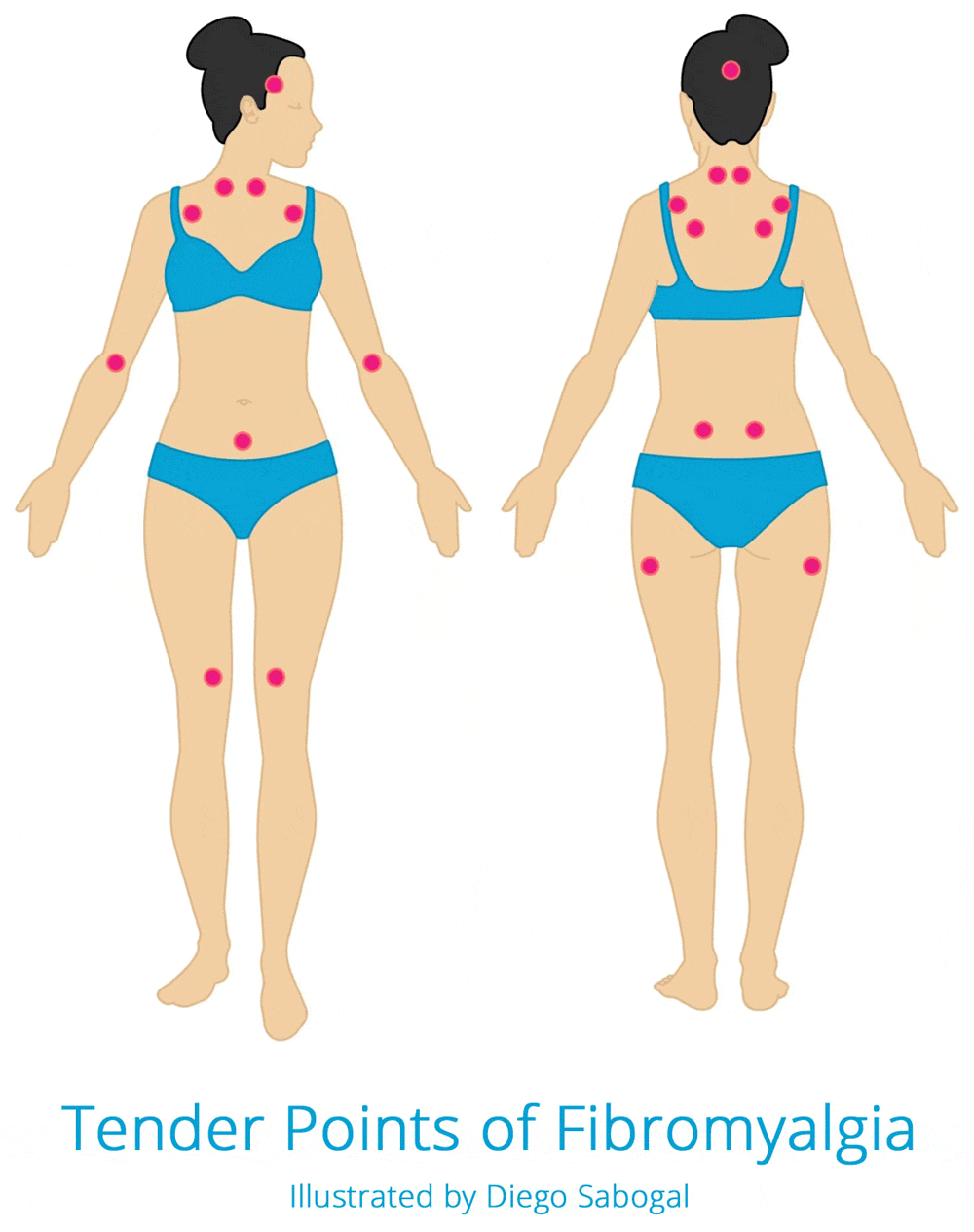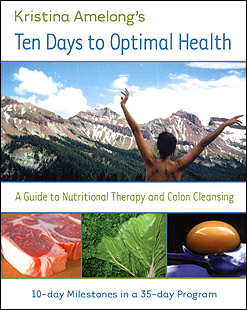What Is Fibromyalgia and What Are the Symptoms?
What Are the Symptoms of Fibromyalgia?
The Fibromyalgia Diet
What Is Fibromyalgia?
Common worldwide, fibromyalgia is a chronic condition that causes widespread body pain. An estimated 5 to 10 million adults in the United States experience fibromyalgia, and 80 to 90% of these patients are women. The population with the highest likelihood of experiencing fibromyalgia symptoms are women age 20 to 50.
Doctors don't know what causes fibromyalgia, but it most likely involves a variety of factors working together. Researchers believe that since fibromyalgia often runs in families, genetics may play a role. For some, symptoms begin after significant illness, physical injury, or psychological trauma.

Fibromyalgia Symptoms and Tender Points
The primary symptom of fibromyalgia is muscle pain, most commonly experienced at what are known as tender points.
This pain may be accompanied by other symptoms such as fatigue, headaches, insomnia, mood swings, difficulty concentrating, anxiety, and/or depression.
Tender points associated with fibromyalgia occur on both sides of the body and include the upper chest, back of the head, tops of the shoulders, outer elbows, hips, and knees.
Fibromyalgia Symptoms in Females
Women often experience additional fibromyalgia symptoms such as heavy or painful menstruation.
Women living with fibromyalgia may experience symptoms associated with Irritable Bowel Syndrome (IBS) more often than men do.
In some cases, pregnancy can worsen symptoms of fibromyalgia.
Consult your doctor about fibromyalgia and pregnancy, as some medications for fibromyalgia can impact the fetus.
Prevention of Fibromyalgia Symptoms
While there is no known cure for fibromyalgia, it is possible to prevent its common symptoms from being triggered. Using essential oils, taking certain supplements, and most importantly, switching to a "fibromyalgia diet" can help you manage the difficult symptoms of fibromyalgia and decrease flare-ups.
According to the Mayo Clinic, exercise, relaxation, and stress-reduction measures also may help.
▶︎ Mindfulness and Persistent Pain: Learn More
The Fibromyalgia Diet
Diet is an important part of fibromyalgia treatment. Your primary goal should be to increase your consumption of whole, unprocessed foods that help reduce inflammation, while avoiding foods that increase inflammation.
Foods you should eat:
- Vegetables, especially green, leafy vegetables such as bok choy, arugula, spinach, kale, carrots, cucumbers, lettuce, potatoes, and squash. (Vegetables are anti-inflammatory and provide essential minerals including magnesium.)
- Fruits such as bananas, berries, grapes, melons, kiwi, and oranges
- Fish, which provides important omega-3 fatty acids
Make sure that you are aware of any food sensitivities or intolerances that you may have. Foods that relieve fibromyalgia symptoms in one person may trigger a flare-up in another, so it is important to pay attention to what you're eating and how your body responds.

Foods to generally avoid:
- High-carb foods, refined sugars, and MSG are known to cause flare-ups
- Processed foods in general
- Gluten
- Alcohol and caffeine
Learn more about a fibromyalgia diet in my book, Ten Days to Optimal Health: A Guide to Nutritional Therapy and Colon Cleansing.
Dietary Supplement Support for Fibromyalgia
According to University Health News, it is important to boost the following minerals and nutrients to help control fibromyalgia pain. Supplements may help.
- Omega-3 fatty acids help decrease inflammation, improve bone and joint health, and offer numerous other health benefits. Eating more fish and leafy vegetables is one way to increase your intake of omega-3 fatty acids, but supplements such as Standard Process Tuna Omega-3 Oil or Orthomega Fish Oil are good options as well.
- Magnesium can help with muscle cramping, insomnia, fatigue, and has a host of other health benefits, both related to fibromyalgia symptoms and not. Supplements like Ortho Reacted Magnesium may have a significant impact on fibromyalgia symptoms.
- Zinc can also help fight inflammation and strengthens your immune system. If you think you may have insufficient zinc levels, Ortho Reacted Zinc could help.
- Antioxidants such as vitamins C, A, and E help fight free radicals. Try Researched Nutritionals C-RLA for vitamin C and antioxidant R-lipoic acid supplementation.
- Ashwagandha, turmeric, and vitamin D supplements may also be beneficial for thoses living with fibromyalgia.
Essential Oils for Fibromyalgia
Finally, some people find relief for their fibromyalgia pain and other symptoms by using essential oils such as the following.
- Helichrysum Italicum Essential Oil has anti-inflammatory and pain relief properties, and is one of the more popular oils for people with fibromyalgia pain.
- Peppermint Essential Oil can help with both muscle pain and "fibro fog" that many fibromyalgia patients experience. Rub this oil (diluted in a carrier oil, such as liquid coconut oil) on sore muscles, or try diffusing it at home or work.
- OHN Coffee Enema Essential Oil Blend - This therapeutic blend of lemon, peppermint, tangerine, geranium, helichrysum, and celery seed essential oils combines some of the best fibromyalgia support oils. Our clients have reported relief from fatigue, mood swings, anxiety, and other symptoms of fibromyalgia when using this blend.
- Lavender, eucalyptus, rosemary, clary sage, and ginger essential oils are also commonly recommended for individuals who experience pain, brain fog, and other fibromyalgia symptoms. These oils can be applied directly to your skin to reduce pain and inflammation, or used as aromatherapy to help with stress, or to clear your mind and lift your mood.
- BROWSE ESSENTIAL OILS
Summary
Living with fibromyalgia pain is not easy, but there are natural treatments that can greatly reduce flare-ups.
The first step is following a fibromyalgia diet and paying close attention to what foods help or hurt your body.
From there, supplements, essential oils, exercise, stress-reduction activities, and mindfulness meditation can further reduce symptoms and improve your overall health.
By Kristina Amelong, CCT, CNC
I-ACT-Certified Colon Hydrotherapist
Certified Nutritional Consultant